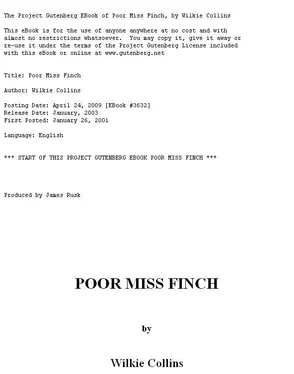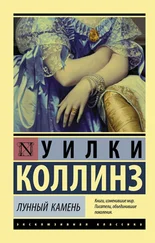Уилки Коллинз - Poor Miss Finch
Здесь есть возможность читать онлайн «Уилки Коллинз - Poor Miss Finch» весь текст электронной книги совершенно бесплатно (целиком полную версию без сокращений). В некоторых случаях можно слушать аудио, скачать через торрент в формате fb2 и присутствует краткое содержание. Год выпуска: 2002, Жанр: Классическая проза, на английском языке. Описание произведения, (предисловие) а так же отзывы посетителей доступны на портале библиотеки ЛибКат.
- Название:Poor Miss Finch
- Автор:
- Жанр:
- Год:2002
- ISBN:нет данных
- Рейтинг книги:3 / 5. Голосов: 1
-
Избранное:Добавить в избранное
- Отзывы:
-
Ваша оценка:
- 60
- 1
- 2
- 3
- 4
- 5
Poor Miss Finch: краткое содержание, описание и аннотация
Предлагаем к чтению аннотацию, описание, краткое содержание или предисловие (зависит от того, что написал сам автор книги «Poor Miss Finch»). Если вы не нашли необходимую информацию о книге — напишите в комментариях, мы постараемся отыскать её.
Poor Miss Finch — читать онлайн бесплатно полную книгу (весь текст) целиком
Ниже представлен текст книги, разбитый по страницам. Система сохранения места последней прочитанной страницы, позволяет с удобством читать онлайн бесплатно книгу «Poor Miss Finch», без необходимости каждый раз заново искать на чём Вы остановились. Поставьте закладку, и сможете в любой момент перейти на страницу, на которой закончили чтение.
Интервал:
Закладка:
"In the capacity of Oscar's friend," I answered. "You will get rid of us both to-morrow." I banged the door behind me, and went up-stairs. If I had been Mr. Finch's wife, I believe I should have ended in making quite an agreeable man of him.
Mrs. Finch met me in the passage on the first floor, and pointed out Oscar's room. I found him walking backwards and forwards restlessly. The first words he said alluded to his brother's letter. I had arranged not to disturb him by any reference to that painful matter until the next morning; and I tried to change the topic. It was useless. There was an anxiety in his mind which was not to be dismissed at will. He insisted on my instantly setting that anxiety at rest.
"I don't want to see the letter," he said. "I only want to know all that it says about Lucilla."
"All that it says may be summed up in this. Lucilla is perfectly safe."
He caught me by the arm, and looked me searchingly in the face.
"Where?" he asked. "With him? "
"With a married lady who is a relative of his."
He dropped my arm, and considered for a moment.
"My cousin at Sydenham!" he exclaimed.
"Do you know the house?"
"Perfectly well."
"We will go there to-morrow. Let that content you for tonight. Get to rest."
I gave him my hand. He took it mechanically—absorbed in his own thoughts.
"Didn't I say something foolish down stairs?" he asked, putting the question suddenly, with an odd suspicious look at me.
"You were quite worn out," I said, consolingly. "Nobody noticed it."
"You are sure of that?"
"Quite sure. Good night."
I left the room, feeling much as I had felt at the station at Marseilles. I was not satisfied with him. I thought his conduct very strange.
On returning to the parlor, I found nobody there but Mrs. Finch. The rector's offended dignity had left the rector no honorable alternative but to withdraw to his own room. I ate my supper in peace; and Mrs. Finch (rocking the cradle with her foot) chattered away to her heart's content about all that had happened in my absence.
I gathered, here and there, from what she said, some particulars worth mentioning.
The new disagreement between Mr. Finch and Miss Batchford, which had driven the old lady out of the rectory almost as soon as she set foot in it, had originated in Mr. Finch's exasperating composure when he heard of his daughter's flight. He supposed, of course, that Lucilla had left Ramsgate with Oscar—whose signed settlements on his future wife were safe in Mr. Finch's possession. It was only when Miss Batchford had communicated with Grosse, and when the discovery followed which revealed the penniless Nugent as the man who had eloped with Lucilla, that Mr. Finch's parental anxiety (seeing no money likely to come of it) became roused to action. He, Miss Batchford, and Grosse, had all, in their various ways, done their best to trace the fugitives—and had all alike been baffled by the impossibility of discovering the residence of the lady mentioned in Nugent's letter. My telegram, announcing my return to England with Oscar, had inspired them with their first hope of being able to interfere, and stop the marriage before it was too late.
The occurrence of Grosse's name in Mrs. Finch's rambling narrative, recalled to my memory what the rector had told me at the garden gate. I had not yet received the letter which the German had sent to wait my arrival at Dimchurch. After a short search, we found it—where it had been contemptuously thrown by Mr. Finch—on the parlor table.
A few lines comprised the whole letter. Grosse informed me that he had so fretted himself about Lucilla, that he had been attacked by "a visitation of gouts." It was impossible to move his "foots" without instantly plunging into the torture of the infernal regions. "If it is you, my goot dear, who are going to find her," he concluded, "come to me first in London. I have something most dismal-serious to say to you about our poor little Feench's eyes."
No words can tell how that last sentence startled and grieved me. Mrs. Finch increased my anxiety and alarm by repeating what she had heard Miss Batchford say, during her brief visit to the rectory, on the subject of Lucilla's sight. Grosse had been seriously dissatisfied with the state of his patient's eyes, when he had seen them as long ago as the fourth of the month; and, on the morning of the next day, the servant had reported Lucilla as being hardly able to distinguish objects in the view from the window of her room. Later on the same day, she had secretly left Ramsgate; and Grosse's letter proved that she had not been near her surgical attendant since.
Weary as I was after the journey, this miserable news kept me waking long after I had gone to my bed. The next morning, I was up with the servants—impatient to start for London, by the first train.
CHAPTER THE FORTY-EIGHTH
On the Way to the End. Second Stage
EARLY riser as I was, I found that Oscar had risen earlier still. He had left the rectory and had disturbed Mr. Gootheridge's morning slumbers by an application at the inn for the key of Browndown.
On his return to the rectory, he merely said that he had been to see after various things belonging to him, which were still left in the empty house. His look and manner as he gave us this brief explanation were, to my mind, more unsatisfactory than ever. I made no remark; and, observing that his loose traveling coat was buttoned awry over the breast, I set it right for him. My hand, as I did this, touched his breast-pocket. He started back directly—as if there was something in the pocket which he did not wish me to feel. Was it something he had brought from Browndown?
We got away—encumbered by Mr. Finch, who insisted on attaching himself to Oscar—by the first express train, which took us straight to London. Comparison of time-tables, on reaching the terminus, showed that I had leisure to spare for a brief visit to Grosse, before we again took the railway back to Sydenham. Having decided not to mention the bad news about Lucilla's sight to Oscar, until I had seen the German first, I made the best excuse that suggested itself, and drove away—leaving the two gentlemen in the waiting-room at the station.
I found Grosse confined to his easy-chair, with his gouty foot enveloped in cool cabbage-leaves. Between pain and anxiety, his eyes were wilder, his broken English was more grotesque than ever. When I appeared at the door of his room and said good morning—in the frenzy of his impatience he shook his fist at me.
"Good morning go-damn!" he roared out, "Where? where? where is Feench?"
I told him where we believed Lucilla to be. Grosse turned his head, and shook his fist at a bottle on the chimney-piece next.
"Get that bottles on the chimney," he said. "And the eye-baths by the side of him. Don't stop with your talky-talky-chatterations here. Go! Save her eyes. Look! You do this. You throw her head back—soh!" He illustrated the position so forcibly with his own head that he shook his gouty foot, and screamed with the pain of it. He went on nevertheless, glaring frightfully through his spectacles; gnashing his mustache fiercely between his teeth. "Throw her head back. Fill the eye-baths; turn him upsides-down over her open eyes. Drown them turn-turn-about in my mixtures. Drown them, I say, one-down-todder-come-on, and if she screech never mind it. Then bring her to me. For the lofe of Gott, bring her to me. If you tie her hands and foots, bring her to me. What is the womans stopping for? Go! go! go!"
"I want to ask you a question about Oscar," I said, "before I go."
He seized the pillow which supported his head—evidently intending to expedite my departure by throwing it at me. I produced the railway time-table as the best defensive weapon at my command. "Look at it for yourself," I said; "and you will see that I must wait at the station, if I don't wait here."
Читать дальшеИнтервал:
Закладка:
Похожие книги на «Poor Miss Finch»
Представляем Вашему вниманию похожие книги на «Poor Miss Finch» списком для выбора. Мы отобрали схожую по названию и смыслу литературу в надежде предоставить читателям больше вариантов отыскать новые, интересные, ещё непрочитанные произведения.
Обсуждение, отзывы о книге «Poor Miss Finch» и просто собственные мнения читателей. Оставьте ваши комментарии, напишите, что Вы думаете о произведении, его смысле или главных героях. Укажите что конкретно понравилось, а что нет, и почему Вы так считаете.






